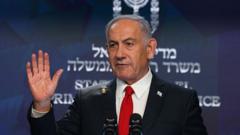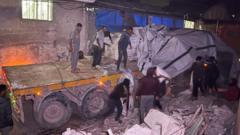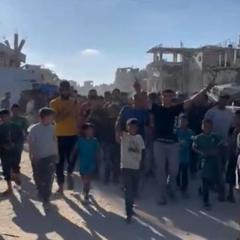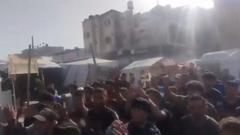As Lebanon grapples with regional tensions and seeks to reassert control, the government is making strides towards disarming armed Palestinian groups in refugee camps. This initiative, slated for June, is seen as a crucial step to challenge Hezbollah's dominance, signaling potential shifts in the balance of power within the country.
Lebanon's Ambitious Disarmament Plan: Targeting Palestinian Groups as a Prelude to Hezbollah

Lebanon's Ambitious Disarmament Plan: Targeting Palestinian Groups as a Prelude to Hezbollah
Lebanon's government prepares to disarm Palestinian factions, paving the way for larger measures against Hezbollah's armament.
In an important development for Lebanon's security framework, the government has announced its plans to commence the disarmament of armed Palestinian groups located within various refugee camps across its territory starting in June. This move was confirmed by a spokesperson for the Prime Minister, underscoring a broader objective to consolidate state control over all weapons in the country.
Mohanad Hage Ali, a fellow at the Carnegie Middle East Center in Beirut, emphasized the significance of this initiative by stating, “This is a test.” He suggested that if the disarmament process is executed efficiently, it may pave the way for a more ambitious agenda to dismantle Hezbollah’s extensive military capabilities. Moreover, the Lebanese state and its military have historically struggled to maintain authority amid the influence of numerous armed factions, with Hezbollah having long asserted its dominance over southern Lebanon.
The presence of Palestinian armed factions in Lebanon's overcrowded and impoverished refugee camps has posed longstanding challenges for the Lebanese military, which has traditionally refrained from entering these areas. However, the recent weakening of Iran-backed militias, including both Hezbollah and Hamas, following conflicts with Israel has prompted Lebanon’s new government to assert its authority and limit militia power within its borders.
By tackling the disarmament of Palestinian groups first, Lebanon is positioning itself to potentially address the more complex task of curbing Hezbollah’s military influence, which remains a cornerstone of its political and military landscape. As Lebanon embarks on this noteworthy journey of disarmament, the outcome will undoubtedly play a critical role in shaping the future stability and governance of the country amidst ongoing regional unrest.
Mohanad Hage Ali, a fellow at the Carnegie Middle East Center in Beirut, emphasized the significance of this initiative by stating, “This is a test.” He suggested that if the disarmament process is executed efficiently, it may pave the way for a more ambitious agenda to dismantle Hezbollah’s extensive military capabilities. Moreover, the Lebanese state and its military have historically struggled to maintain authority amid the influence of numerous armed factions, with Hezbollah having long asserted its dominance over southern Lebanon.
The presence of Palestinian armed factions in Lebanon's overcrowded and impoverished refugee camps has posed longstanding challenges for the Lebanese military, which has traditionally refrained from entering these areas. However, the recent weakening of Iran-backed militias, including both Hezbollah and Hamas, following conflicts with Israel has prompted Lebanon’s new government to assert its authority and limit militia power within its borders.
By tackling the disarmament of Palestinian groups first, Lebanon is positioning itself to potentially address the more complex task of curbing Hezbollah’s military influence, which remains a cornerstone of its political and military landscape. As Lebanon embarks on this noteworthy journey of disarmament, the outcome will undoubtedly play a critical role in shaping the future stability and governance of the country amidst ongoing regional unrest.




















